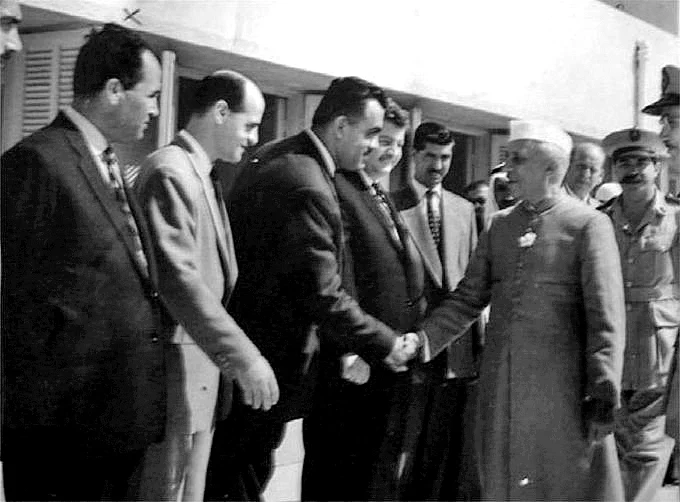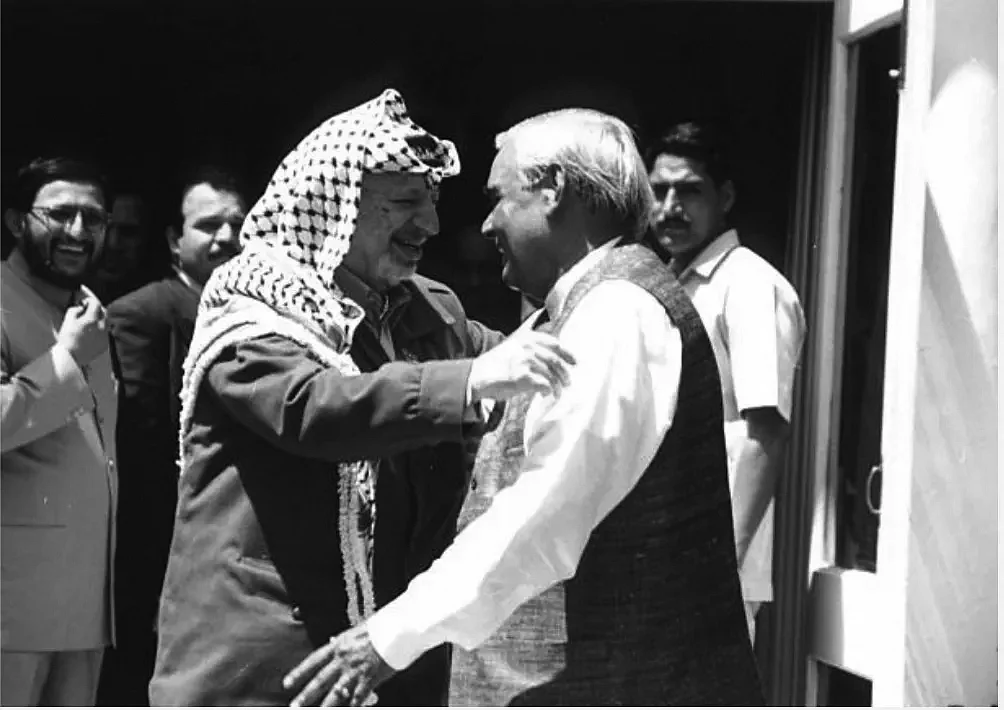Israel–Hamas conflict: Modi’s stand jeopardises India’s position on Kashmir
It weakens India's argument on Pakistan’s forcible and illegal occupation of a swathe of Jammu & Kashmir, says Ashis Ray

The killing of innocent Israeli civilians by the militant outfit Hamas is unforgivable, and so is Israel’s indiscriminate retaliation. However, Indian prime minister Narendra Modi’s hasty and arguably ill-conceived pronouncements on the conflict between the two sides weaken India’s position as far as Pakistan’s occupation of Kashmir, Gilgit and Baltistan is concerned.
Pakistan has demonstrated no signs at any stage of withdrawing from this land. Indeed, it has refused to honour UN Security Council Resolution 47 of April 1948, calling on its armed forces and militia to clear out of Jammu and Kashmir, which in October 1947 signed an instrument of accession to merge with India.
Indian freedom and the creation of Pakistan—a separate homeland for Muslims demanded by the Muslim League—arose out of a constitutional transfer of power by Britain, which had hegemony over an undivided India. This enactment stemmed from an Indian Independence Act passed by the British parliament. The Act granted neither India nor Pakistan the right to pick and choose its provisions, only to agree to it in entirety.
Both the Indian National Congress and the Muslim League—both party to negotiations with British authorities—had accepted the proposal presented to them by the British viceroy, Lord Louis Mountbatten.
The Act gave princely states ruled by maharajas, nawabs and suchlike the discretion to join India or Pakistan or neither. In this situation, Maharaja Hari Singh of Jammu and Kashmir indicated he needed time to ponder over his decision. He offered standstill agreements to India and Pakistan, which the latter signed.
In early October 1947, though, Pakistan violated the pact, with armed infiltrators from its soil entering Jammu and Kashmir and overrunning considerable parts of its western and northern segments. The invaders were in fact on the verge of capturing the capital, Srinagar.
At this point, the maharaja appealed to India for assistance. The Indian government agreed to intervene, but only on the basis of a lawful treaty. Thus, the instrument of accession.
So, why is Modi’s unconditional support of Israel prejudicial to India’s interests vis-à-vis its stand on Pakistan’s occupation of Kashmir, Gilgit and Baltistan? The nation of Israel has mushroomed on soil that belonged to Palestine.
In November 1917, Britain, then a major imperial power, proposed the creation of a homeland for Jews in the country which is the birthplace of Judaism and Christianity. A month later, the British captured the ancient city of Jerusalem from the Ottomans.
In 1922, the League of Nations—a forerunner to the United Nations—formally awarded Britain a mandate over Palestine.
In the 1930s, a flood of Jewish immigration—instigated by the persecution of Jews in Nazi Germany and the unpopular British colonial rule in Palestine—triggered a revolt among the Arab majority in the country. At the same time, the horrific treatment of Jews by Germany’s dictator, Adolf Hitler, swayed international sentiment in favour of establishing a Jewish state in Palestine.
In 1947, Britain renounced the League of Nations mandate. And the United Nations General Assembly (UNGA)—the UN having meanwhile come into being—voted to partition Palestine into independent Arab and Jewish states.
The Arabs rejected the plan, while the Israelis were divided. Hard-core Israelis were displeased about the whole of Palestine not being awarded to Jews. Nevertheless, they went along with the UNGA vote and declared the birth of Israel in May 1948, forcibly grabbing more territory than allocated to it by the UN. Neighbouring Arab states immediately attacked Israel, but the hostilities ended in a stalemate.
In the late 1940s and early 1950s, nearly a million Palestinians were displaced from their land and replaced by an equal number of Jews from Arab nations. Mere pockets of Palestine remained with Palestinians—the West Bank, East Jerusalem and the Gaza Strip.
The Palestine Liberation Organisation (PLO) was formed in 1965, and under the leadership of Yasser Arafat reached a peace accord with the Israeli government in 1993. This authorised the Palestinian National Authority (PNA) to administer parts of Gaza and the West Bank pending a final resolution of the conflict.
In 2012, the PNA was extended non-member observer status by the UN, which enabled it to participate in General Assembly debates.
The extremist group Hamas has been at odds with the comparatively moderate PNA and has continually carried out an armed resistance against Israel. In response, the Israeli security forces have repeatedly and violently abused unarmed Palestinians.
Besides, Israel has contemptuously spurned the two-state solution desired by the international community, committing aggression, imposing Israeli settlements on Palestinian territory and illegally enlarging its footprint.

When the UNGA voted for two states in 1948, India opposed the partition of Palestine, suggesting a federal state with two autonomous regions. In other words, secular India was thoughtfully allergic to a state based on religious exclusivism—having suffered the bitter experience of Pakistan being carved out on a similar premise.
In 1949, India also voted against Israel’s membership of the UN on the grounds that it had come into existence through the use of force. However, the following year, Prime Minister Jawaharlal Nehru granted recognition to Israel, without translating this to full diplomatic status.
Israel hankered after greater ties with India; but the former’s extra-judicial conduct made India uncomfortable. After the collapse of the Soviet Union, an important ally, Prime Minister P.V. Narasimha Rao in 1992 converted Nehru’s in-principle recognition to an in-practice one.
In response, Israel enthusiastically endorsed India’s position that Pakistan should vacate the part of Jammu and Kashmir it held.
Yet, in 2003, when the then Israeli Prime Minister Ariel Sharon visited India, the joint statement emanating from his meeting with prime minister Atal Bihari Vajpayee did not reiterate the stand taken by the Congress government of Narasimha Rao.
Israel was perceived to have watered down its stance because it sensed that the Bharatiya Janata Party (BJP) was quite anxious about having closer relations with Tel Aviv.

Israel denied it had shifted its policy on Kashmir. But British intelligence cited that Israel supplied components for F-16 fighter planes to the Pakistan Air Force. Under the 2004–2014 government of Prime Minister Manmohan Singh, New Delhi maintained a constructive relationship with Tel Aviv, but with a degree of caution.
Israeli Prime Minister Benjamin Netanyahu’s widely condemned expansionist attitude towards Palestine has been partly designed to divert attention from the criminal charges he faces.
From an Indian standpoint, Modi’s disregard of Israel’s persistent unlawful encroachments is unethical. It also dilutes India’s argument on Pakistan’s forcible and illegal occupation of a swathe of Jammu & Kashmir.
In 1973, Israel won the Yom Kippur war over a coalition of Arab states, after the Israelis had been taken by surprise by the Egyptian attack. Prime Minister Golda Meir paid a price for her government’s intelligence failure by having to resign a year later. The knives are already out for Netanyahu. His political opponents are far more numerous than Meir’s. Can he survive in office, no matter how strongly he reacts against Hamas?
Follow us on: Facebook, Twitter, Google News, Instagram
Join our official telegram channel (@nationalherald) and stay updated with the latest headlines
